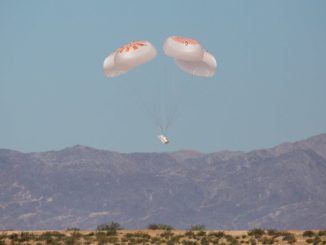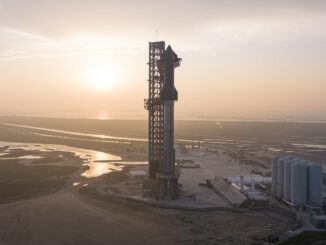
The first Soyuz launch from Kazakhstan carrying a full load of more than 30 Florida-built satellites for OneWeb’s broadband Internet network has slipped from December to mid-to-late January, OneWeb officials said.
A OneWeb spokesperson said the satellites will be transported from their factory near NASA’s Kennedy Space Center to the launch base at the Baikonur Cosmodrome in Kazakhstan next month. OneWeb aims to begin limited service with its broadband network, which will eventually number at least 650 satellites.
“We are taking the utmost care to prepare for launch and therefore are taking a few extra weeks to conduct additional tests on the satellites which will be shipped in December for launch,” said Katie Dowd, a OneWeb spokesperson. “We are targeting our next launch for mid-to-late January and remain on track for monthly launches thereafter and to begin service in the Arctic in late 2020 and global coverage in 2021.”
OneWeb launched its first six test satellites — each about the size of a mini-fridge — in February aboard a Soyuz rocket from the Guiana Space Center in South America. Those satellites were built at an Airbus Defense and Space factory in Toulouse, France.
OneWeb Satellites, a joint venture between OneWeb and Airbus, opened a 105,500-square-foot satellite production facility in July at Exploration Park, Florida, just outside the gates of the Kennedy Space Center. OneWeb is building the rest of its satellites there, at a rate the company says will increase to produce up to two spacecraft per day.
Arianespace won a lucrative contract in 2015 for 21 Soyuz launches to carry OneWeb’s initial constellation of 650 satellites to orbit. After the launch in February from French Guiana, Arianespace has 20 more Soyuz flights in its backlog to fill out the OneWeb constellation. The launches could take off from Baikonur, French Guiana, or the Vostochny Cosmodrome in Russia’s Far East.
The first flight of Europe’s new Ariane 6 rocket late next year will also loft a batch of OneWeb satellites. OneWeb and Arianespace announced the agreement for the Ariane 6 flight earlier this year. OneWeb has contract options for launches aboard two additional Ariane 6 missions.
OneWeb’s Ku-band satellites fly polar orbit around 745 miles (1,200 kilometers) above Earth, but the Soyuz launchers release the spacecraft — each about the size of a mini-fridge — at a lower altitude. The satellites use plasma thrusters to maneuver into the OneWeb constellation.
OneWeb’s broadband fleet could grow to 1,980 satellites, the company said.
Earlier this year, OneWeb announced that it demonstrated live HD video streaming through the company’s first six satellites. OneWeb and Iridium, which operates a low Earth orbit network with 66 cross-linked L-band communications and data relay satellites, announced an agreement in September to work toward a combined service offering.
OneWeb is in heated competition with SpaceX, which has launched 120 Starlink broadband satellites on two dedicated Falcon 9 rocket flights this year, the most recent of which occurred Monday.
SpaceX, which builds its satellites in Redmond, Washington, plans to initially launch up to 1,600 satellites on a series of Falcon 9 rockets to fly in 341-mile-high (550-kilometer) orbits. The company, led by billionaire Elon Musk, has approval from the Federal Communications Commission to eventually operate up to 12,000 Starlink broadband satellites.
Documents filed with the International Telecommunication Union last month suggested SpaceX could seek regulatory authority for up to 30,000 additional spacecraft, bringing the Starlink network to some 42,000 satellites.
Like OneWeb, SpaceX says it could start serving high-latitude regions the Starlink broadband coverage next year, followed by the inauguration of global service.
Amazon founder Jeff Bezos is also eyeing a broadband satellite network named Kuiper, but that project is still in the planning stages.
Email the author.
Follow Stephen Clark on Twitter: @StephenClark1.



